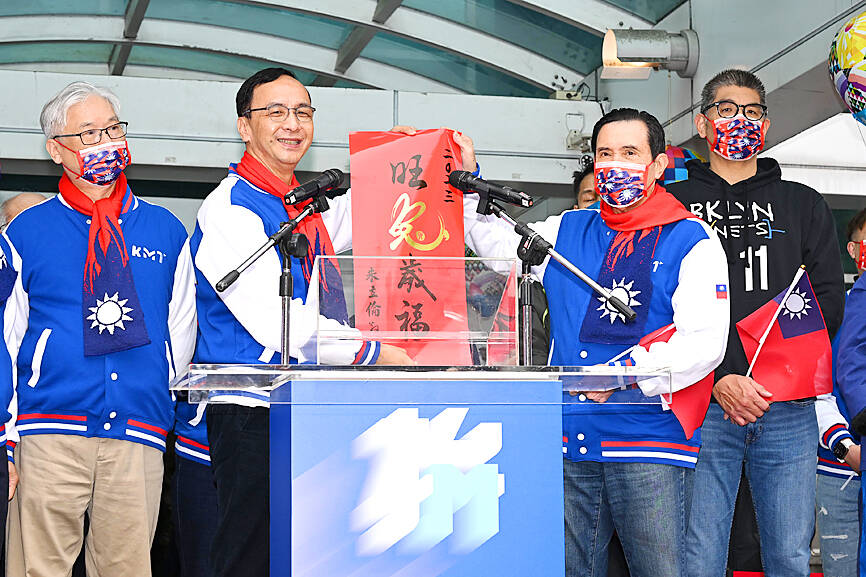Next year’s presidential and legislative elections offer a choice between war and peace, former president Ma Ying-jeou (馬英九) said yesterday.
“Vote for the KMT [Chinese Nationalist Party], and there will be no battlefield across the Taiwan Strait,” he said.
Speaking at a flag-raising ceremony hosted by the KMT at its headquarters, Ma said the “resist China, protect Taiwan” policy promoted by the Tsai Ing-wen (蔡英文) administration over the past six years had caused an unprecedented increase in cross-strait tensions.

Photo: Hu Shun-hsiang, Taipei Times
The Democratic Progressive Party’s (DPP) cross-strait policy is out of tune with public opinion and has lost public support, said Ma, who served as president from 2008 to 2016.
Taiwan should not only prepare for war, but also avoid war, he said.
Avoiding war means not being provocative, and as a gesture to that end, Taiwan should reopen the “small three links” as soon as possible to ensure national secutiry along with the well-being of Taiwanese, he said.
The “small three links” refer to direct trade, postal and transport services between China and the Taiwanese outlying islands of Kinmen and Matsu. The links were initiated on Jan. 1, 2001, but were suspended in February 2020 amid the COVID-19 pandemic.
Regarding Tsai’s restoration of one-year mandatory military service for young men, Ma said: “Vote for the DPP, youth go to the battlefield. Vote for the KMT, there will be no battlefield on either side of the strait.”
Ma credited KMT Chairman Eric Chu (朱立倫) for substantial gains in the mayoral and councilor elections on Nov. 26. The KMT won 14 of the 22 city and county leadership posts being contested.
With morale bolstered within the KMT, Ma said the party should work toward victory in the Taipei and Nantou legislative by-elections later this month and in March respectively, as well as the presidential and legislative elections next year.
Addressing the ceremony, Chu said that the KMT is determined to win the legislative by-elections and nominate strong candidates for the national elections.
The KMT must “walk the right path and select the right people” to run in next year’s elections, and must be “selfless and united” to achieve its goals, he added.

The Ministry of Economic Affairs has fined Taobao NT$1.2 million (US$36,912) for advertisements that exceed its approved business scope, requiring the Chinese e-commerce platform to make corrections in the first half of this year or its license may be revoked. Lawmakers have called for stricter enforcement of Chinese e-commerce platforms and measures to prevent China from laundering its goods through Taiwan in response to US President Donald Trump’s heavy tariffs on China. The Legislative Yuan’s Finance Committee met today to discuss policies to prevent China from dumping goods in Taiwan, inviting government agencies to report. Democratic Progressive Party Legislator Kuo Kuo-wen (郭國文) said

The Ministry of Economic Affairs has fined Taobao NT$1.2 million (US$36,900) for advertisements that exceeded its approved business scope and ordered the Chinese e-commerce platform to make corrections in the first half of this year or its license would be revoked. Lawmakers have called for stricter supervision of Chinese e-commerce platforms and more stringent measures to prevent China from laundering its goods through Taiwan as US President Donald Trump’s administration cracks down on origin laundering. The legislature’s Finance Committee yesterday met to discuss policies to prevent China from dumping goods in Taiwan, inviting government agencies to report on the matter. Democratic Progressive Party

Taiwan and its Pacific ally Tuvalu on Tuesday signed two accords aimed at facilitating bilateral cooperation on labor affairs, according to Taiwan’s Ministry of Foreign Affairs (MOFA). The governments inked two agreements in Taipei, witnessed by Foreign Minister Lin Chia-lung (林佳龍) and visiting Deputy Tuvaluan Prime Minister Panapasi Nelesone, MOFA said in a news release. According to MOFA, the agreements will facilitate cooperation on labor issues and allow the two sides to mutually recognize seafarers’ certificates and related training. Taiwan would also continue to collaborate with Tuvalu across various fields to promote economic prosperity as well as the well-being of their

Sung Chien-liang (宋建樑), who led efforts to recall Democratic Progressive Party (DPP) Legislator Lee Kun-cheng (李坤城), was released on bail of NT$80,000 today amid outcry over his decision to wear a Nazi armband to questioning the night before. Sung arrived at the New Taipei District Prosecutors’ Office for questioning in a recall petition forgery case last night wearing a red armband bearing a swastika, carrying a copy of Adolf Hitler’s Mein Kampf and giving a Nazi salute. Sung left the building at 1:15am without the armband and covering the book with his coat. Lee said today that this is a serious